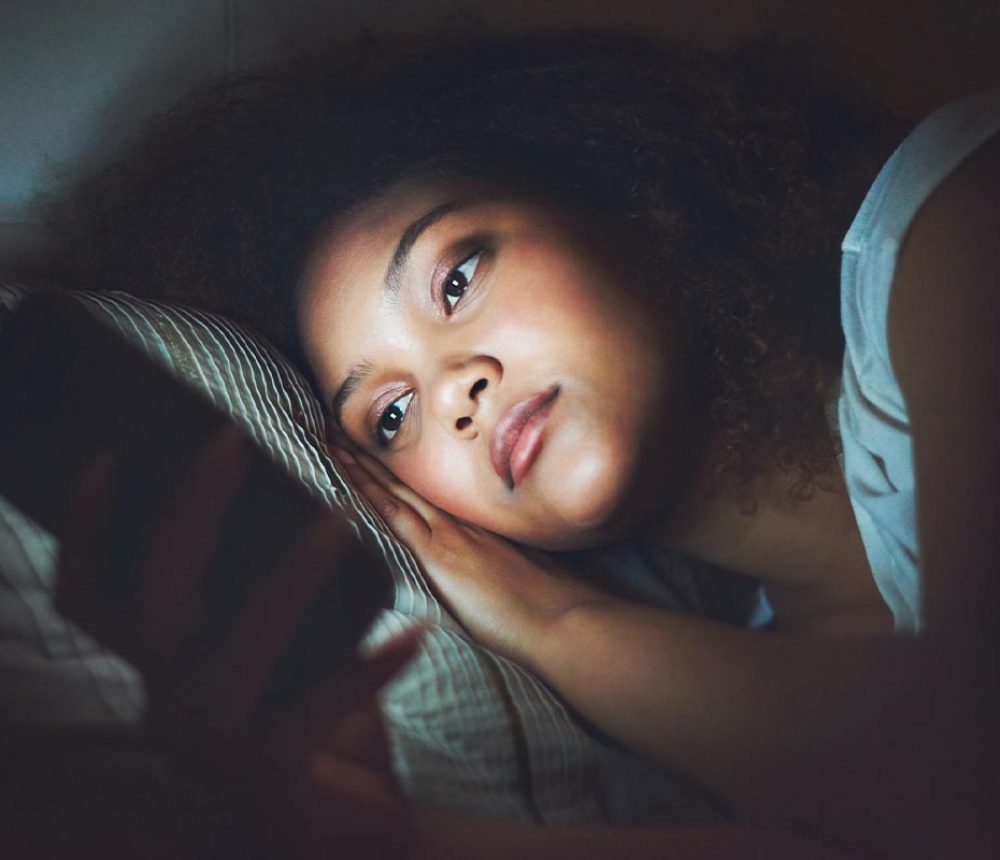
Internet addiction is the silent pandemic that has gripped our world while we (don’t) sleep. There are over 4.66 billion active internet users worldwide, accounting for around 60% of the global population.(1) Arguably, the internet has been a lifeline for many during this global pandemic in which we have been unable to interact with the people we love as we normally would, and yet it is also our downfall. The difficulties of integrating back into normal human interactions as the threat of Covid diminishes could possibly be escalated by the internet dependencies that have developed over the course of our year in isolation.
Excessive internet use is generally described as when internet use is so uncontrolled and time-consuming that a person loses all sense of time and experiences severe disruption to their daily life. The worldwide prevalence of internet addiction has been shown to be as great as 18%. Heavy internet use is known to be associated with mood disorders, low self-esteem, impulsivity, low levels of physical activity, health problems (migraines, back pain, obesity) and poor sleep quality(2). Importantly, internet addiction not only affects sleep quality and duration, but also leads to a higher incidence of insomnia(3).
There are many reasons for this link between high internet usage and poor sleep. A critical factor, as our mums will always remind us, is the screen that delivers the internet content to us. Numerous studies have shown that using screens before bed increases the amount of time it takes to fall asleep.
This is to do with our “body clock.” When the sun rises, the body produces cortisol, a hormone that makes you feel awake and alert, and as the sun sets, the body releases melatonin, which induces sleepiness. Devices like mobile phones, tablets, and computers emit high-frequency light waves known as blue light. This blue light delays natural melatonin production in the evening and so you feel less tired. As well as delaying sleep, blue light can affect sleep quality by reducing the amount of time spent in slow-wave and rapid-eye movement (REM) sleep. These sleep stages are vital for cognitive functioning(4) .
Internet addiction, in the form of playing games and watching movies online before sleep, can also impact sleep duration by stimulating the central nervous system or by causing emotional fluctuations. Excessive internet use can also take a physical toll on the body, affecting normal physiological body functions. Any associated physical pain or discomfort can have a knock-on impact on sleep quality(5).
Minimizing our internet usage is clearly a great way of improving our chances of a good night’s sleep, and a good night’s sleep is a great way of boosting our general wellbeing. However, with the internet leaking its way into every aspect of life as we know it, with many of us relying on consistent connectivity throughout the day for work, excessive internet usage is hard to avoid. As we break out of lockdown, and for many, experience new lifestyle changes through new ways of working and socialising, it’s time to take stock of our internet use, and reconnect with nature instead.
Easier said than done? The first step in addressing our love-love relationship with the internet is to admit it(6). Once we recognise our problem, we can take active steps to overcome it. If you’re feeling brave, you can tackle your addiction using your own determination and strength. Implement limits on screen time (there are apps to help with this), introduce an electronic curfew, delete or reduce social media apps, or maybe even take a digital detox – a whole week or even weekend without the internet can certainly help us to reassess our priorities and rediscover hobbies. Here at Trelonk, our favourite tactic for hijacking the endless scrolling is the No Red Rule; if you have no messages or notifications (which appear as little red bubbles on your apps), then your app doesn’t need your attention and you don’t need its!
However, if you’re feeling too weak in the face of internet-based temptation to implement your own restrictions, fear not, there are more effective management strategies. One solution is to seek therapy from a professional to help identify the source of the addiction. Alternatively, make efforts to socialise more with friends in person, which shouldn’t be too hard now that we’ve got all that lost time to make up for! We can also replace online reading with books, online games with board games, and online shopping with high street shopping. One of the most successful ways of reducing internet usage is to create a more structured routine. If we timetable our days and make priority-based “to-do” lists, we are far more likely to be productive and distracted from the temptation of our phones.
Perhaps the best way to avoid, and even reverse, the negative effects of internet addiction, is to get outdoors, be physically active and engage with nature. Even better, leave your devices at home or turn your mobile data off. Go for walks, explore new areas of coastline or countryside, join sports or fitness or conservation clubs and groups, or even partake in the popular Japanese practise of forest bathing and simply enjoy the trees in your surroundings to help shut down all those tabs that are open in your brain. Once you get home, you may even decide you don’t need to use the internet after all.
References
Disclaimer: Our products are not intended to prevent, treat or cure any disease or serious illness. If you have any health concerns please contact your doctor or pharmacist.
© 2022 TRELONK